HeadStuff Picks | The Best Movies of 2017: #10-1
We are closing in on the top spot for the HeadStuff Film writers’ Best Movies of 2017. If you haven’t caught our picks for #20 to #11 check it out here. Let’s jump back in with our Top Ten:
#10 Dunkirk Dir. Christopher Nolan
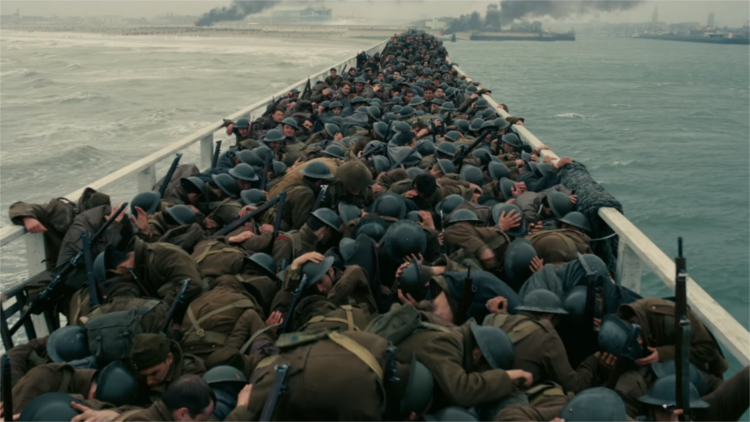
It hits you in those opening seconds. We’re so used to seeing Brad Pitt, Matt Damon, Tom Hanks et al in the Second World War that the sheer youth of the cast that make up the bulk of Christopher Nolan’s Dunkirk grabs you immediately. Nolan makes it clear in this introductory seconds that none of his charges are safe, pursued by a relentless, unseen and never formally identified enemy. Casting Harry Styles, normally seen pampered and preening in pop videos was a stroke of genius.
After a twin of misfires that suggested that maybe success had gone to his head, Nolan’s proved yet again that he embodies cinema like no other director working today. Sure, there’s been criticism, often made by individuals stuffed to the gills with theory, that the Dunkirk offers little the way of character development, commentary or criticism. Maybe. But in terms of channelling direct, visceral emotion in the way that only cinema can, than very little touched Dunkirk this year. On a shot by shot basis, Nolan adheres the careful commandments set out by Eisenstein, Kuleshov and Tarkovsky (made all the more evident if its viewed in 35 mm, where the screen cracks and fizzles as it inevitably does when one thinks of those Soviet masters) to craft a film that has one foot in avant experimentalism and another is blockbuster entertainment.
By now, most people will have seen The Last Jedi, a blockbuster micro-managed to within an inch of its life. If big blockbuster are to take a certain route, I know which I prefer. Adam Duke
#9 Blade Runner 2049 Dir. Denis Villeneuve
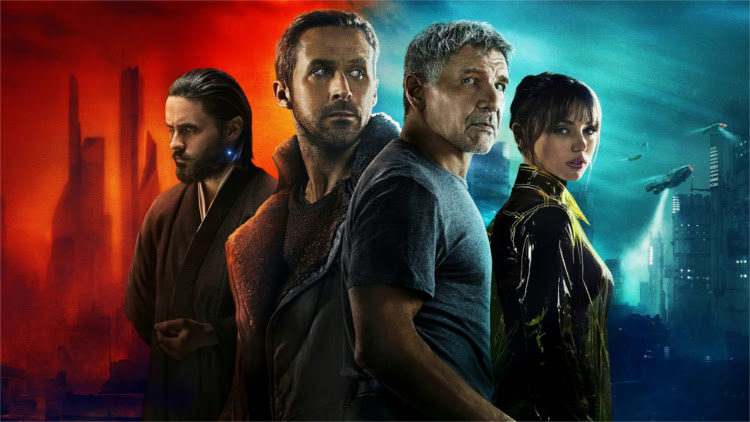
Early on Dave Bautista’s android tells Ryan Gosling’s blade runner, K, his problem is that he has never seen a miracle. However, 164 minutes later viewers will have. Who thought it was possible to produce a worthy sequel to arguably the most obsessed over film of all time, let alone one that may surpass the original? Well, that’s what Denis Villeneuve (Sicario, Arrival) did.
The film takes the best elements of the original but forks its own distinct path to explore Dickian themes on the unreliability of memories and dreams. Gosling (in full Drive mode) stars as an android designed to kill his own kind, discovering a mystery in the process that leaves him questioning his own reason for being. Revealing more would be too much but what I can say is 2049 has the best CGI ever put to film. The world’s greatest DOP Roger Deakins makes the sci-fi setting – including a Vegas under a blood red sky or a cityscape with holograms as big as buildings – feel authentic and real. It’s hypnotic watching Gosling navigate this incredibly realised futuristic setting, with his brooding broken occasionally by crisply staged brutal violence. While the movie can feel a tad cold and sterile throughout (intentional given its about robots), it only makes the wave of emotion conjured in the final shots even more of a gut punch. Stephen Porzio
#8 Thor: Ragnarok Dir. Taika Waititi
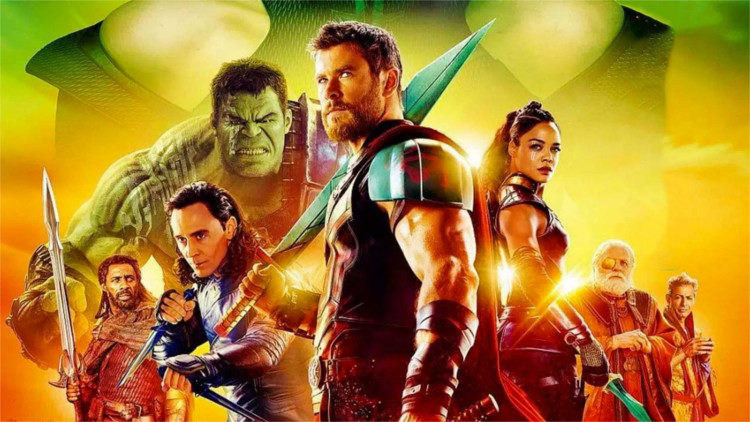
Taking perhaps the most struggling of the various solo-series and handing it off to crazed provocateur Taika Waititi was nothing short of genius. If there’s been a major problem with Thor outside of his Avengers appearances, it’s that his films – in which a magic man with a flying hammer who lives in a city with a rainbow bridge – have had a bad habit of taking themselves too seriously. Ragnarok risks going too far the other way; Blanchette is having the most fun of any MCU villain to date, the comedy is relentless as an evisceration of both this individual franchise and the wider genre, all while giving every actor that turned up more freedom to just say whatever the hell(a) they wanted. Yet amongst that there are some striking visuals and the kinds of shots that look ripped straight from their source material in terms of both composition and just the shear balls out weird colours and designs. Add in that score dripping synth and you’ve got gleefully enjoyable confection of a film. Yet one with subtle and neat comments about imperialism and post-colonialism tucked away behind the madness. Richard Drumm
#7 A Ghost Story Dir. David Lowery
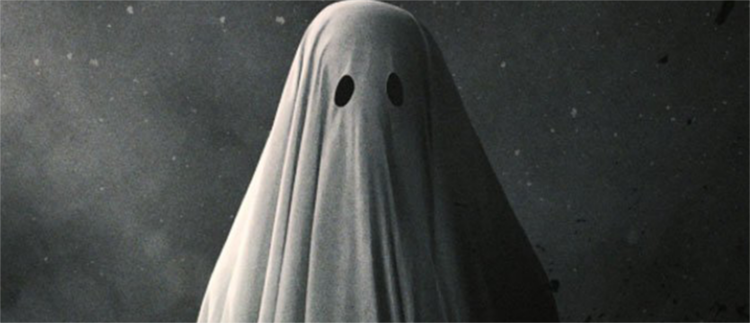
Cinema—and let’s face it, art itself—is so often made to distract us from the dread-inducing existential realities that we’d rather forget. David Lowery’s surrealist tale of a deceased, formally-married male spirit who haunts the same home for eternity choses instead to look straight into the void and find a kernel of hope in the process. So yes, the ever-lasting, all-consuming nature of time itself makes our short stint on this planet seem utterly meaningless, but that the emotional connections we make while were here matters to us at all is made all the more meaningful because of that fact. The best-ever arthouse indie that features a Kesha cameo, the film is gorgeous for something made on a shoe string. Like the unknowable love note imbedded into the wall that stays there for generations, A Ghost Story will outlast us all and it’s not about what it says, it’s about how it makes us feel. Mark Conroy
#6 The Killing of a Sacred Deer Dir. Yorgos Lanthimos
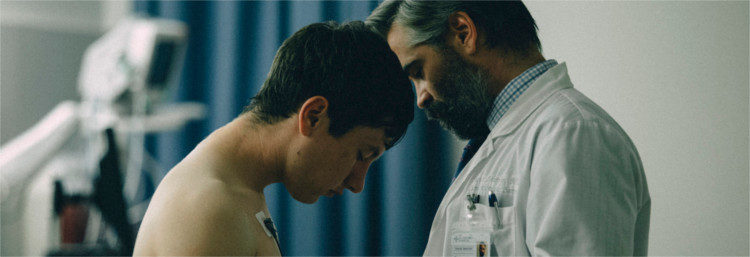
Yorgos Lanthimos is the exactly the type of directory that the Hollywood machine chews up and spits out. Going from a weird, disturbing debut (Dogtooth) to an absurdist comedy (The Lobster), in theory left him primed for his next movie, a nice tidy historical drama, that’d allow him to enter the ranks of polite filmmaking. Between them he opted to make The Killing of a Sacred Deer, a loud, piercing screech of a movie. Lanthimos always has both eyes firmly focused on the most void dwelling of themes and the practical ability to construct a film that takes you there. Whilst Sacred Deer never quite reaches the absurdities of Mother!, it does take its audience to some pretty weird places, but Lanthimos is such an able guide that you feel like you have no choice but to go along.
If I was a Hollywood actor, I’d be clamouring to work with Lanthimos, who clearly has a supernatural ability to wring the best from his actors, be it introducing a surreal sense of sterility to Nicole Kidman’s natural beauty or amplifying Barry Keoghan’s natural strangeness. On a more technical note, the crisp, strong staging captured by Thimios Baktakis and muscular lighting force you to imagine that what your seeing is entirely plausible, even as the action veers towards the allegorical. Yet again, even as the film moves towards a pitch-black hole, Lanthimos can hit you with a side splitting gag. Fingers crossed he stays firmly on the margins. Adam Duke
#5 Logan Dir. James Mangold
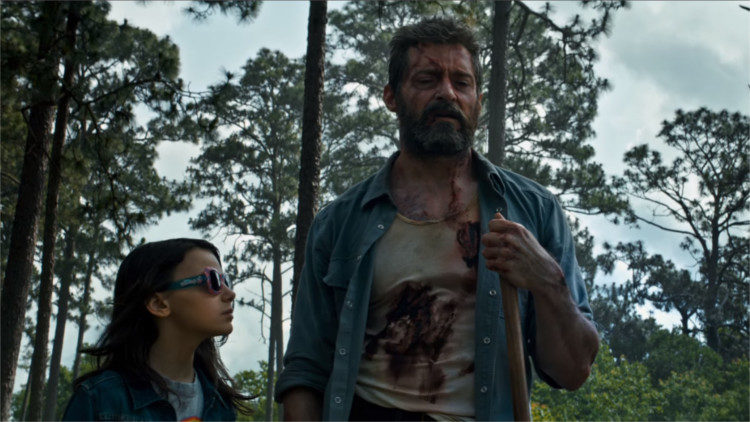
Logan was regarded by many as the best superhero film ever made. They were right. When the first trailer arrived, sound tracked by Johnny Cash’s ‘Hurt’ it was clear what we were getting. Logan tells many stories about heroes and the people they help and the people they harm. It’s a story that darkly echoes our present but one that, above all, feels painfully human. It’s the film Wolverine deserves and a swan-song for a character that could have been laughable but grew into a wounded animal worthy of an audience’s love.
Hugh Jackman has played Wolverine for seventeen years in nine films. His enigmatic past, amnesia and ferocious nature are pure B movie material, but Jackman imbued the immortal, clawed mutant with grace, humour and pathos that even Patrick Stewart couldn’t manage as Professor X. It takes a great deal of skill to take such a silly character and put meat on those adamantium covered bones. Jackman’s performance has not been matched within the superhero genre before or since.
Logan is part-Western, part-family drama and part-road movie. Family runs in the film’s blood from the fucked-up family of Logan, Professor X and sunlight shy mutant Caliban (Stephen Merchant) to the fucked-up family of Logan, Professor X and Laura (Dafne Keen) to the black farming family that Logan fucks up in the film’s domestic second act. Families are everywhere in Logan including both the mutant hunters and the mutant children. In the great tradition of Americana these families are tested, torn apart and redeemed.
Logan is a brutal film. Jackman’s grunts and snarls as he hacks his way through mutant hunters are some of the most visceral pieces of sound design I’ve ever heard. The fights between Logan and his clone wouldn’t be out of place in a superpowered version of The Raid. Director James Mangold leaves nothing out as Logan paints forests, hotel rooms and deserts red. Instead of feeling off it feels natural, like a Wolverine film should feel. It shows Mangold’s commitment from script page to set to editing suite.
If we must talk feral fight scenes, then let’s talk Laura. Logan’s bilingual and, by way of cloning, biological daughter Laura is the future of mutants and Logan is racing to save her from the men that want her DNA. Dafne Keen is second on the film’s list of exceptional performances though she is entirely silent for half of the film. By turns vulnerable, furious and playful Keen makes Laura her own and if a successor to Jackman is being considered then I see no reason why she shouldn’t be chosen.
Logan is a superhero film but unlike the Avengers or Justice League it is a very human film. We see our heroes as paralysed, scarred and flawed. But in the end, that only makes them more human. Logan dares to imagine our heroes as humans that embody ideals worthy of being passed on to the next generation in the hope that they may continue to strengthen and grow. Andrew Carroll
#4 The Handmaiden Dir. Park Chan-wook
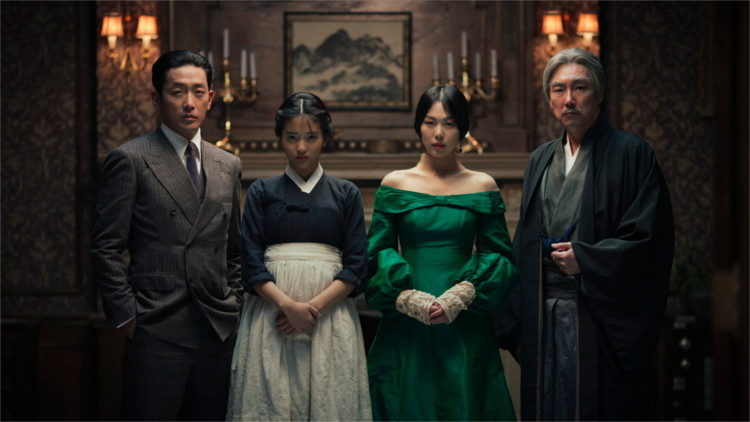
In The Handmaiden, a character delivers the line “a story is all about the journey”. It’s a telling piece of dialogue as the joy of Oldboy director Park Chan Wook’s latest is less the story than the irreverent way he tells it. The opening scene sets up the film as something akin to an Asian Gosford Park or Downton Abbey. In Japan-occupied Korea, poor young village woman, Tamako (a fabulous Kim Tae-Ri), is chosen to be the handmaiden for wealthy coloniser and heiress Lady Hideko (Kim Min-Hee), a solitary figure ruled over by her sleazy, authoritarian uncle, Kouzuki (Cho Jin-Woong).
Yet, under the guise of a period drama, Chan-Wook made the most riotously entertaining, funny and sexiest thriller of the year. Within ten minutes, the writer-director pulls the first of many rugs out from under the viewer. Tamako, whose real name is Sook-Hee, is actually the daughter of a legendary thief and is pulling a con. Hired by a crook posing as a Count (Ha Jung-Woo), it’s her job to convince Lady Hideko into marrying her fellow con-artist. The plan is to throw the heiress into a mental institution post-wedding – with Sook-Hee and her accomplice splitting the bride’s riches.
What’s great fun about The Handmaiden, based upon a novel by Sarah Waters entitled Fingersmith, is how wickedly fun it is despite being set in an environment known for being clinical and cold. Set in high society, based on story written by a British author and featuring a character obsessed with British culture – Chan-Wook’s film deliberately evokes a type of English cinema and literature defined by strict social mores and repressed sexuality. Thus, it gives The Handmaiden a subversive thrill when, with every twist, it becomes more insane and unruly with graphic sex scenes, a perverted book-club and an escape from a mental institution all being introduced into its plot.
The Handmaiden is arguably the most successful film in recent memory to channel the spirit of Hitchcock’s best work. Without spoiling, the movie is about attraction and sexuality in a way which could evoke comparison to 2017’s other highlight Call Me by Your Name. Over the course of the drama, we see character’s desires for each other slowly enhancing through voyeuristic glimpses and stolen touches, eventually being unleashed in unexpected fits of pleasure. All the while, Chan-Wook swaps between character POV’s, casting information we previously took as given into doubt as scenes are replayed from different perspectives. The result is a movie that tantalises while keeping viewers on their toes right up until the moment it reveals its endgame. Here all the pieces of the narrative jigsaw come together, and one realises that Chan-Wook for 145 minutes has been setting the stage for our female heroes to vanquish their male oppressors. It’s a great feminist message, one which helps to dilute criticisms from some quarters that the film’s sex scenes strayed over into pornographic territory. Stephen Porzio
#3 The Big Sick Dir. Michael Showalter
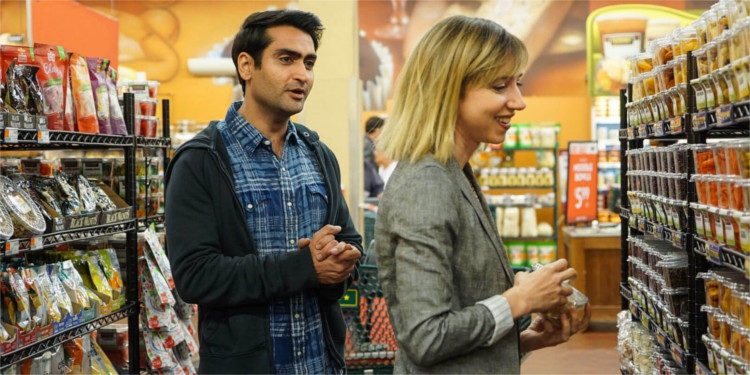
Like Annie Hall before it, The Big Sick gave new life to a genre that is so often maligned for saccharine sentimentality and witless one liners. The rom-com, in it’s traditional form, hasn’t been making the cultural impact it once did but the truth is, the genre isn’t gone, it’s just less recognisable and The Big Sick is a shining example of this subtle re-definition. In fact, had the tale not been based on true events, incredulous audiences would be forgiven for thinking this is yet another absurd Hollywood idea of ‘true love’ after reading the plot synopsis. Instead what was offered was one of the most honest and heartfelt takes on relationships that mainstream cinema has given us in years.
Pakistani-American comedian Kumail Nanjiani plays himself, a stand-up comedian in Chicago who embarks a whirlwind romance with a young white girl named Emily (Zoe Kazan) after a one night stand. The obstacles to their ‘happy ever after’ aren’t your typical genre affair. Kumail’s heritage means he’s expected by his parents to take part in an arranged marriage with a woman from his culture and then there’s the titular Big Sick, the mysterious illness that threatens Emily’s life and leaves her in an induce coma for much of the runtime. So there’s enough story here to film a tome but the excellent script, written by Nanjiani alongside real life partner Emily V. Gordon, never overdoes it and deftly interweaves the elements, giving each of them the required time to breath.
The cultural and generational gap between Kumail and his parents isn’t played for cheap laughs, but rather it’s a source of real conflict for a character who is desperate to be true to himself and to the country he hails from. When the film pivots into a terms of endearment type territory, it never loses sight of its characters or the emotional reality of the situation. Don’t be put off, this is still a humour driven film and it’s always funny, but its pathos lands just as well as many of the jokes do. The supporting work, especially from the likes of Holly Hunter and Ray Ramano as Emily’s parents, all play their part and then some and Nanjiani proves that there is no one better to play him than himself. Even if Emily isn’t conscious for a sizable portion of the film, the scenes Kazan and Nanjiani share are endearing in that way that if you see the film with your significant other, it’s likely a few knowing looks will be shared between the two of you. The Big Sick was 2017’s nicest surprise in almost every way. The romantic comedy is dead. Long live the romantic comedy. Mark Conroy
#2 The Florida Project Dir. Sean Baker
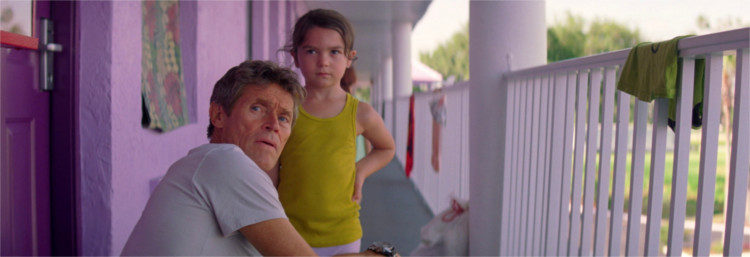
This year, with one feature, Sean Baker didn’t just give us one of film’s most empathetic depictions of poverty, but also one it’s best depictions of childhood. Set at The Magic Castle, a puke-purple motel originally intended to reside well-to-do Disney World patrons, The Florida Project follows low-income families living pay check to pay check in a place few would be comfortable calling ‘home’. Most attention is paid to unemployed stripper Halley, the kind of loving, brazenly rampaging mother who sticks used tampons to windows in anger and must provide for her daughter Moonee by any means. Haylee is tour de force of bad decisions at time when choices and prospects are limited, but no-one would deny the affection she holds for her child. While the action may sound punishingly bleak, Baker eschews cheerlessness by wisely giving much of story’s reins to children who live in blissful ignorance of their parents and their own misfortunes.
To these kids, the Magic castle and its mundane surroundings aren’t grim reminders of deprivation but rather a playground made boundless by their own imaginations. Their wholesome explorations and inanely charming interactions with each other and the grown-ups around them provide some of the most successfully grounded comic material in all of 2017. Thanks in no small part to the stellar turns of rising stars like 6 year old Brooklyn Pierce, Baker nails the wide-eyed wonder and self-assured silliness of pre-pubescent interaction. It’s sounds so effortless on screen that we know there must been a whole lot of effort with these young actors off screen. This is all without even mentioning the best character of the year Bobby Hicks, the hyper-reasonable, understanding motel manager played by now-Oscar favourite Willem Dafoe. To the residents, Hicks is a fixer and parental figure. To the audience, he is the film’s moral compass and Dafoe plays that role with understated perfection. A saintly figure, He is a diplomat who sees the penury around him and appeases everybody—the kids, Haylee, his boss—but himself. Look out for one quietly powerful scene where he slyly confronts a paedophile and guides him off the property while the playing children are non the wiser.
In a year of Wonder Women, Spidermen and Justice Leagues, he is the hero we need right now: a humble man just trying to do his job but ends up doing so much more. Of course, this isn’t to say that Baker ignores the grim socio-economic realities his characters preside in. In the film’s devastating climax, we see Moonee’s escape of a fantasy world come crashing dawn as she’s made confront the cruel rawness of the deal she was given. It’s heart-breaking but Baker’s camera remains a deeply humanistic onlooker, always stubborn to try and understand and explain, as oppose to judge and condemn. It’s so easy now to a call a work like this a vision of Trump’s America but the truth is much harder to swallow than that. The Florida Project isn’t the story of Trump’s America, it’s a story of America. Mark Conroy
#1 Get Out Dir. Jordan Peele
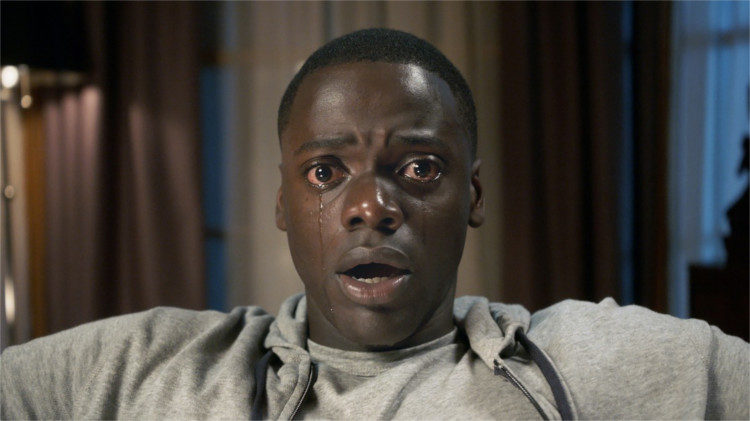
Jordan Peele’s Get Out opens on the suburban streets beloved of American horror films. It’s a quiet night. A young black man is lost among the well kept lawns, isolated and feeling out of place. A long, steadicam shot stalks him as the audience, and then him, notice a white car following him at the slow, deliberate pace of a predator. Anachronistic, creepy, old time music plays softly from inside, teasing him with the words ‘Run rabbit, run rabbit, run, run, run…‘ He tactfully tries to turn around and take a different route but too late notices that a masked figure has emerged. It’s over for him.
On the surface the opener isn’t all that different from a million other horror movies. What makes Get Out so refreshing is it takes recognisable tropes but puts a new spin on them. Here the suburbs aren’t an idyll to be invaded by some evil force. They are threatening in and of themselves. The unfortunate young guy talks to a friend on his phone about how, as an outsider, they creep him out. The scene also demonstrates Peele’s understanding of genre history. It’s like watching an inverse of John Carpenter‘s Halloween and also nods to The Shining both in its steadicam staging and when the victim remarks that the area is ‘like a hedge maze’. Peele knows his stuff, knows how to drop a reference without getting up his own ass and he knows how to make the familiar creepy in a whole new way.
Peele, given his comedy background, also knows how to make Get Out a very funny experience. The plot concerns Chris (Daniel Kaluuya) meeting Rose’s (Allison Williams) white, upper class family and throughout they attempt to reassure him by repeatedly mentioning their liberal credentials. They would’ve voted for Obama a third time if given the chance, after all. The cringe comedy works but also serves to ratchet up the unease as it becomes more and more apparent that their principals are performative. Soon it segways from Guess Who’s Coming to Dinner into Rosemary’s Baby.
Get Out is certainly ‘A film about issues’ but it’s smart because its politics are smart. It’s a horror about racism but no-one is a secret Klansman (although Williams’ performance as Rose becomes something much scarier). The villains insist, right to the end, that this isn’t some vulgar race thing. The story is more interested in smart observations than obvious platitudes about prejudice. A takedown of the liberal fetishisation of minorities feels fresh and very needed.
Of course the politics wouldn’t matter if Get Out wasn’t wonderfully scary piece of popcorn in its own right. It is. The criticism applied to much ‘post horror’ (what a wanky term) is that they’re art house movies that are ashamed of their genre. That doesn’t apply here. Get Out has brains but also blood.
This is a startlingly well realised and confident debut film, an experience that changes on rewatching and a movie that is destined to be remembered as fondly as the classics that it references. The unlikely journey from a low budget B-movie to a serious awards contender is heartening and Peele is now a director to watch. If his take on The Twilight Zone is half as scary, funny or smart as Get Out it’s going to be fantastic. Ged Murray

